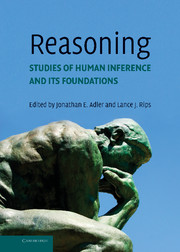Book contents
- Frontmatter
- Contents
- Preface
- List of Contributors
- Introduction: Philosophical Foundations
- PART I FOUNDATIONS OF REASONING
- PART II MODES OF REASONING
- Section 3 Deductive Reasoning
- 9 Logical Approaches to Human Deductive Reasoning
- 10 Mental Models and Deductive Reasoning
- 11 Interpretation, Representation, and Deductive Reasoning
- 12 Reasoning with Quantifiers
- 13 The Problem of Deduction
- Section 4 Induction
- Section 5 Dual and Integrative Approaches
- Section 6 Abduction and Belief Change
- Section 7 Causal and Counterfactual Reasoning
- Section 8 Argumentation
- PART II INTERACTIONS OF REASONING IN HUMAN THOUGHT
- Index
- References
9 - Logical Approaches to Human Deductive Reasoning
Published online by Cambridge University Press: 05 June 2012
- Frontmatter
- Contents
- Preface
- List of Contributors
- Introduction: Philosophical Foundations
- PART I FOUNDATIONS OF REASONING
- PART II MODES OF REASONING
- Section 3 Deductive Reasoning
- 9 Logical Approaches to Human Deductive Reasoning
- 10 Mental Models and Deductive Reasoning
- 11 Interpretation, Representation, and Deductive Reasoning
- 12 Reasoning with Quantifiers
- 13 The Problem of Deduction
- Section 4 Induction
- Section 5 Dual and Integrative Approaches
- Section 6 Abduction and Belief Change
- Section 7 Causal and Counterfactual Reasoning
- Section 8 Argumentation
- PART II INTERACTIONS OF REASONING IN HUMAN THOUGHT
- Index
- References
Summary
The idea that formal logic bears a close relationship to human reasoning is extremely controversial within cognitive science. For example, Wason and Johnson-Laird (1972: 245) concluded their influential study of reasoning by stating that “only gradually did we realize first that there was no existing formal calculus which correctly modeled our subjects' inferences, and second that no purely formal system would succeed.” This kind of opposition is based on evidence that subjects' judgments about an argument sometimes depart from the answer that the experimenter derived by translating the argument into some system of logic and assessing its correctness within that system. The strength of this evidence, however, clearly depends on the system the investigator uses. If the investigator's conception is too narrow, what is classified as nonlogical behavior may turn out logical after all. To evaluate the evidence, we need some clear idea of what logic has to offer.
Most cognitive theories that contain a logic-like component (e.g., Braine 1978; Johnson-Laird 1975; Osherson 1974, 1975, 1976; Rips 1983) are based on the notion of proof, particularly the “natural deduction” proofs originally devised by Gentzen (1935/1969) and Jaskowski (1934). The basic notion is familiar to anyone who has taken a high school mathematics course: If you want to know whether a particular argument is deductively correct, you can find out by taking its premises as given and then trying to derive its conclusion by applying a specified set of rules.
- Type
- Chapter
- Information
- ReasoningStudies of Human Inference and its Foundations, pp. 187 - 205Publisher: Cambridge University PressPrint publication year: 2008
References
- 7
- Cited by



